ERIC meets CASSANDRA LIN of TURN GREASE INTO FUEL
This interview is part of our Conversations for Change series that enables readers to act. Imagine you go on a walk with her, we have time to speak. This is more, deeper and more awesome than what you’re used to. Get a drink, get comfy, dive in.
Eric, YL: Hey, Cassandra, I am glad I get a chance to speak to you, seeing how busy you are – and how dear your work is to me, something I wish to see go to scale at – well, pretty much every school. I think that’s a reasonable aim. What do you think?
Cassandra: I think that’s an awesome goal – let’s make it happen!
YL: Okay, let’s agree on an aim: By the end of this interview, everyone will be able to launch it. That’s an interview that makes sense. Before we talk about a DIY (do-it-yourself) list for youth and citizens around the globe, I’d like to find out more of the story behind this adventure. How did it all start?
Cassandra: The story started in October 2008, when I visited the Energy Solutions Expo at the University of Rhode Island and found out that biodiesel, a clean-burning alternative energy, could be produced from waste cooking oil. Then I read an article about a local charity in our area called the WARM (Westerly Area Rest and Meals) Center, which had initiated a campaign titled “One Dollar Makes A Difference.” In this campaign, residents donated $1 each week to go towards emergency heating assistance.
I was shocked that people in my own community were struggling to heat their homes in our harsh New England winters.
Surely, I thought, I could find some way to help these needy families. So I got together with my friends, and we thought that if we could convince people to recycle their waste cooking oil, we could find a way to turn it into biodiesel and help heat the homes of these struggling residents.
This idea became Project TGIF: Turn Grease Into Fuel.
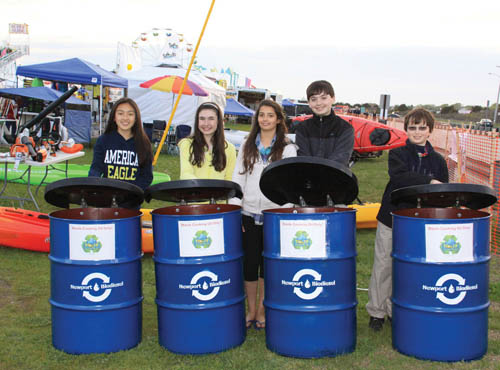
YL: What are your strongest motivations? To run an intriguing project? Solving the energy and climate issue? Generating funds for people in need? Cleaning up? Changing the understanding of „waste“? Which one ignited your passion? Which one kept it going?
Cassandra: My strongest motivation is knowing, and seeing the impact that we are making. Because of this student-led project, 210 families have been able to stay warm in the winter. I’m constantly amazing by that fact, and it makes me want to keep going even more.
YL: What were the first reactions by people around you?
Cassandra: My family has always been incredibly supportive of me, so naturally they jumped on board with this idea. My dad is the coach of our team, and my brother is the assistant coach.
YL: Did you have concrete, long-term aims from the start?
Cassandra: Our original plan was to deliver the first round of Bioheat® to families in need by March, collect more than 3,000 gallons of waste cooking oil per month by April 30th, and produce more than 25,000 gallons of biodiesel annually by December.
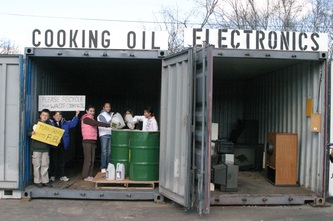
YL: Gradually, numbers climbed to tens and tens of thousands of dollars for people’s benefit. How was the experience? Are there two or three breakthrough stages you remember?
Cassandra: It was awesome! Our first breakthrough was in March 2009, when we donated the first 2,000 gallons of BioHeat to the WARM Center and the Bradford Jonnycake Center. After that, we were able to accumulate more donations of BioHeat every winter!
Also, a major breakthrough for TGIF was when our Used Cooking Oil Recycling Act was passed into law in July, 2011 and went into effect on January 1, 2012. The other breakthrough was when one of my teammates got a chance to talk to the management group of a bunch of hotels and persuaded them to donate their waste cooking oil to TGIF. We started getting cooporation accounts after that.
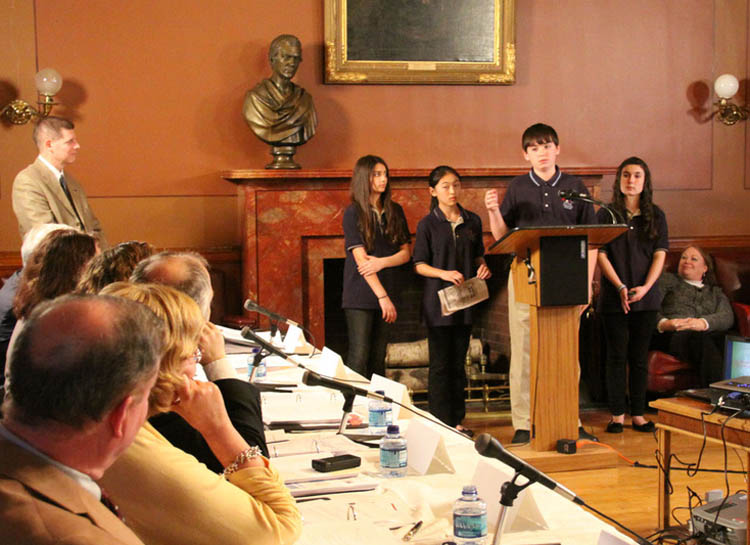
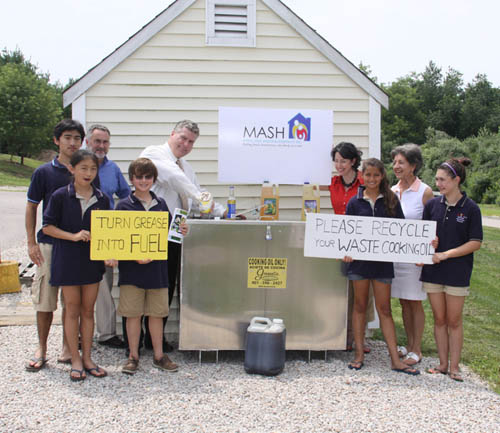
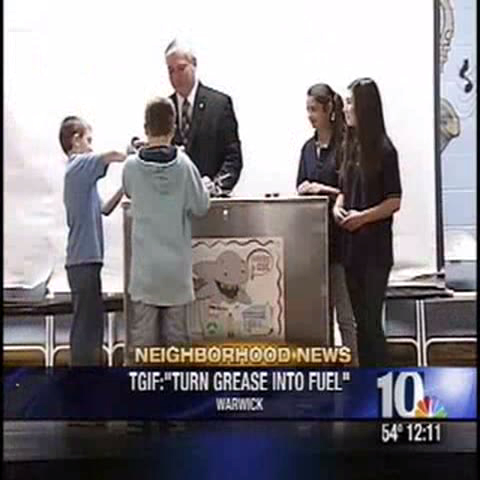
YL: What were most memorable moments?
Cassandra: One of the most memorable moments was when we were able to visit one of the recipients of the emergency heating assistance TGIF was able to provide. We met with a single mom who had a little boy and was really struggling to heat her home. To be able to see how grateful she was for our help and actually talk to her – it was truly a life-changing experience and inspired all of us to continue our work.
YL: Were there big surprises along the way?
Cassandra: The support from our community was great – we were featured so many times in the local paper and we were so honored that people took notice of what we were doing to help our community and local environment! We started getting media attention, I was surprised when CNN called me and selected us to be one of the Young Wonders last year!
YL: Unexpected challenges? And how did you overcome them?
Cassandra: There are always unexpected turns along the way. Due to the bad economy in 2009, our biodiesel refiner went out of business. Luckily, we were able to quickly find another refiner. We also had to change our grease collector to find another that was more local and could provide reliable and quick service to the restaurants. By doing this project, we have all learned that it is crucial to be flexible in your plans, because one way or another things will not turn out how you plan them!
YL: Did any legislation need to be changed or upgraded? Like permissions for youth, schools, businesses?
Cassandra: No, we tried to follow the current regulations since safety and liability are important to us. In addition, we always keep good relations with the school’s superintendent, so he will understand and support our project. Keeping a good relationship with authorities is essential for the success of the project!
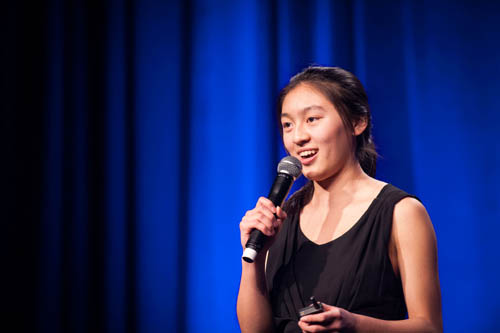
YL: Were there ever moments when the project faced shut-down? When obstacles seemed unsurmountable?
Cassandra: Because of all the support we had from our friends and families, we never ever thought that giving up was even an option. Yes, we’ve had difficulties along the way, and yes, we’ve had people turn us down and shut us down and tell us this couldn’t possible work, but…you can’t let that stuff get to you, you know? We knew from the start that what we were doing was bigger than ourselves. TGIF was too important to us to let go. So no matter what obstacles we faced, we knew what we wanted to do with this program and had our hearts and minds set on accomplishing our goals. We did go through some difficult moments; however, we survived with all the teammates and supporters working together and we brainstormed alternative solution ideas. We are still facing those moments now and then, like heavy competition for used oil from big businesses.
YL: What’s this? Does it mean other businesses are contacting your restaurant partners to take their fuels?
Cassandra: Yellow grease is a commodity since it can not only be converted into biodiesel, but many companies make pet food from the grease. Believe it or not, there are many grease thieves as well. So we call this a “Grease War!”
YL: What is their strategy? Do they offer to pay more? Because they keep all the profits for themselves?
Cassandra: When we started our project, there were many restaurants that still paid someone to remove their waste cooking oil, similar to a garbage removal service. Then biodiesel became valuable, and even more so with incentives from the government for using alternative energies. Some companies offer to pay more to buy grease from restaurant owners and others offer discounts on new cooking oil in exchange for grease collection.
YL: And how is your restaurant partners’ reaction? Do they stick with you because they know it is going to directly benefit the community?
Cassandra: We had to modify our strategy to adopt the situation change. We started giving options to our restaurant owners and they had a choice to donate 10-100% of their grease and keep the rest of the money for themselves. Most of the local restaurants still give TGIF 100% of their grease though. We are targeting residential grease and promoting waste cooking oil recycling from the residents. We set up ten public grease recycling locations in Rhode Island and Connecticut, which covers an area of 300,000 residents.
YL: That’s a wonderful thing. Congrats to those restaurant owners! When people can choose good, many do. I think it’s a great message to all young people eager to start this project in their cities. That explaining the direct benefits on real lives makes a difference.
Cassandra: Definitely!
YL: You are a driving force behind the initiative. What about your team mates? Who are they? How did they join?
Cassandra: My teammates are awesome. We were all friends in 5th grade, when this project took off. I basically asked them if they were interested in starting a community service group with me to help the environment and community, and they said yes! Currently I have five of my friends working with me on Project TGIF, and they are Vanessa Bertsch, John Perino, Taylor Fiore-Chettiar, Miles Temel, and Isaac Kaufman.
YL: What novel aspects did they bring in? Did someone’s talents suddenly help take the project to greater scale?
Cassandra: One of the first things we ever did as a team was sit down and talk about our strengths and weaknesses (it’s harder than you would think!). We knew that each teammate could bring something new to the team, and we wanted to use our strengths and weaknesses to our advantage so we could work more efficiently. For example, I took the lead as PR representative of TGIF and talked to restaurant owners, legislators etc, while John helped with analyzing data in our biodiesel tests.

YL: What supportive role can adults play, by the way? Let’s start with school: What kind of teachers do you need? And what kind of regular, official structure can best allow you to run this at school? An ecoclub?
Cassandra: Teachers are so important. The best way they can help is get their students passionate about things like the environment and science and cool things in general. Where there is passion, people are willing to do something.
Teachers can help start ecoclubs at school, and just get participation going at the school by getting the kids educated about the environment and getting them involved.
Another important factor is project ownership. The students need to have ownership of the project so they are most likely to stick with it. They need to take pride in their work and be proud of their project.
Each school or state or country is in a different situation; the project leader needs to find the best way to maximize his/her resources.
We set up our organization outside the school for the purpose of continuation of the project as well as so we don’t need to deal with issues such as school budget.
Again, there is no reason that a school can / will prevent you from starting a project with a good cause if you don’t ask for funding and follow the rules.
YL: You have even taken the project from elementary school to high school, right?
Cassandra: Yes, we are currently all ninth graders in high school.
YL: Have high school teachers been welcoming to your idea, or did you have to convince them, even change the way they handled student projects?
Cassandra: We primarily work outside of school, so this has not really been an issue that we have come across.
YL: Your schools are very supportive of student projects. Obviously, they have understood the great value in such projects. How would you, as a student, describe the benefits in comparison to classroom-learning?
Cassandra: The benefits of a student project go on and on. Along the way, you learn so many lessons that are going to stay for you for the rest of your life, like how to be a salesman (we sell our project to restaurant owners), engage with audiences, public speaking, and teamwork, to name a few. These things cannot be taught in a book or in a lesson. You have to be out there and experience it for yourself!
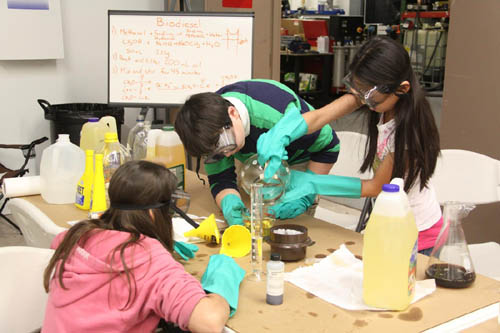
YL: Does your project involvement positively affect your school life?
Cassandra: Definitely! As cheesy as it sounds, I would not be the same person I am today if I hadn’t started TGIF. I’m a lot more confident in myself since starting this project, which has positively affected my relationships with my friends and family. My presentation skills and public speaking have dramatically improved as well! My teammates also have high self-respect and they carry this into their academic work.
YL: Imagine school abruptly changing to NO projects at all, only theory blah blah in class settings. Which feelings and thoughts come to mind?
Cassandra: I think it would be really sad because kids learn in so many different ways. You can learn so much by creating a video, or making a presentation to the class, or designing and making crafts. If you limit these things and only allow teachers giving lectures in a classroom and that sort of thing, you’re really just limiting the kids and their potential.
YL: I perfectly agree, and so do parents and organisations, also entrepreneurs. So – how can these groups help? Your venture, but also for student groups setting out to START a grease-to-fuel project. I imagine support, legal structure, storage, transportation, media work, printing, recognition, …
Cassandra: I think students need to have motivation before they start. Adults cannot push students to do community service. Youth Leader’s efforts to inspire students to do something are very important. Parents or entrepreneurs should be mentors to guide the students. They should only facilatate, not be in charge of the projects. It would be nice if they wanted to start a TGIF project; however, they may want to look at other options if the students do not show much interest.
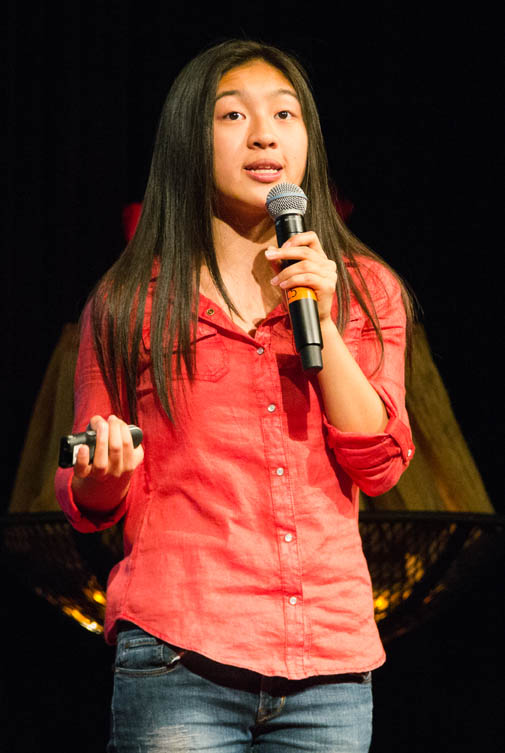
RESTAURANTS IN THE PROGRAM
YL: We’ve learned a lot about your work from your video clip. It’s really well done! And you say you use this 5 minute presentation to gain respect and trust from new partner businesses. So it makes a huge difference to get the idea, concept, feasibility across – that it IS a real project …. Would you say it’s vital? That without it, you’d feel like … hampered, unprepared?
Cassandra: Videos are powerful since it is premade and you can have your audiance learn a lot from your project through this kind of media. It is a good tool; however, you can use whatever you have to achieve the same result. I have learned how to do so-called „elevator pitches“, in which you need to try to sell your idea in like one minute to someone you just met – like in an elevator. There are many ways to get the word out with new technology. Be creative and surprise your audience!
YL: How did this video come about?
Cassandra: We made several videos along the way. It’s about how we started the project and how we helped the families in need. We also added how we lobby the restaurant owners and presentations we made to raise awareness. We remake the video each year since we are growing up and the project is growing as well.
YL: Was it a big deal to produce? Did you participate in creating the script?
Cassandra: No it wasn’t!
We kept good records, which included videos and photos since we started the project.
We also get the permission to use clips from MTV, NBC…etc. who filmed some of our activities for news or documentaries.
Yes, all of us kids wrote the script ourselves.
YL: Do you believe young people can create their own videos to share their projects? After all, we all got used to handheld cell phone clips from youtube.
Cassandra: Definitely! You would be amazed at how skilled young people today are with technology. If kids and youth want to do it, then they can definitely accomplish it.
YL: If young people wish to start this in London, Philadelphia, Buenos Aires, Bangkok, Wladiwostok, Hiroshima, Frankfurt … would they be allowed to use your video?
Cassandra: Of course! The video is on YouTube, after all.
YL: You have shared your knowledge with other youth eager to start the project in their city. If our readers are inspired – and I KNOW many will be… Do you offer consultation? We would love to have you on our YL Speakers list, available for school, event, conference presentations and international webcasts, too.
Cassandra: Yes, that would be awesome! I love talking to others that are interested in starting their own projects, it’s seriously amazing to think that others are inspired by TGIF and want to take action! I would suggest them to do research before start since each location is different and they may need to modify the project to fit their community.
YL: What’s on a How-To-List?
Cassandra:
1. Find out how locals deal with cooking grease first. Some cultures have lots of fried food and others may have none.
2. Locate your local resources such as non-profit organizations, NGOs, media, culinary schools, chain restaurants… Utilizing your local resources can make your project effuicient.
3. Put together a team, find students who are willing to make a difference and contribute their time. Dedication is just as equally (and perhaps even more) important than talent.
4. Find good mentors like parents or teachers who want to provide consistent support.
5. Make a good plan and start small, fine tune the operation process along the way.
6. Set up your short term targets and long term goals as well as a realistic time line.
7. Don’t start the project if you don’t believe your plan will work. Once you decide to start the project, stick with it until the end.
YL: I imagine setting up an official structure or entity, like a business or club, can seem huge for kids or teachers. Do you feel it’s a big deal?
Cassandra: I think setting up a business structure is not as hard as maintaining it since most of the kids or even teachers may not have the experience needed to make the structure function. The project can just start with a layout of separate responsibilities so teammates can share the work load. The team can change the structure to make it work better. I think it may be a better idea to let the team figure out how they want to run the organizaton by themselves. They may come up with some very innovative ideas.
YL: I think I know a solution even for those that don’t have ecoclubs and youth NGOs. Ecoclubes is a global network of independent, self-organised youth clubs. We are partners. I’ll talk to them.
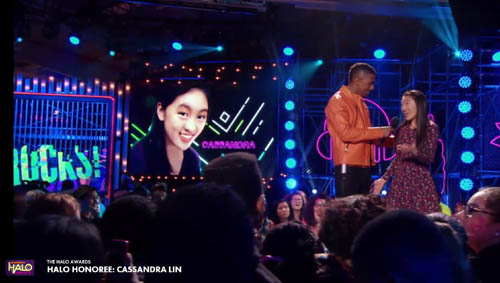

DOLLARS WORTH OF HEATING FOR FAMILIES IN NEED
There’s another important thing we need to talk about: The personal requirements.
This project can only work with tenacity. It’s a serious business, you have to be there for clients. Reliable and long-term. Has this been a problem for you guys at your age?
Cassandra: Everyone has crazy schedules. It’s hard to coordinate sometimes, but really, if you want to do something, you will make time! Also, this is why we work with existing businesses; we chose reliable and trustworthy businesses to be our partners.
YL: How many hours a week do you spend on it? And on how many days? Mornings? Afternoons? Evenings? When do you get and deliver stuff?
Cassandra: We built our project graduately; one restaurant a time. We worked more hours when we started the project or when we prepare for presentations.
Sometime it takes 10-12 hours a week.
After the project was established for six months, we worked based on each teammate‘s schedule and it was more flexible. Our parents drive us around as the project calls for it and
we now spend about 5-6 hours each week.
YL: In addition, there is promotion, public presence, also bookings as speakers. Does this mean there’s something every second week-end?
Cassandra: No, these events are never so perfectly divided! They usually just occur throughout the year. Sometime we have to turn down some events if we have a conflicting schedule. We needed to learn time management, which is another lifelong skill.
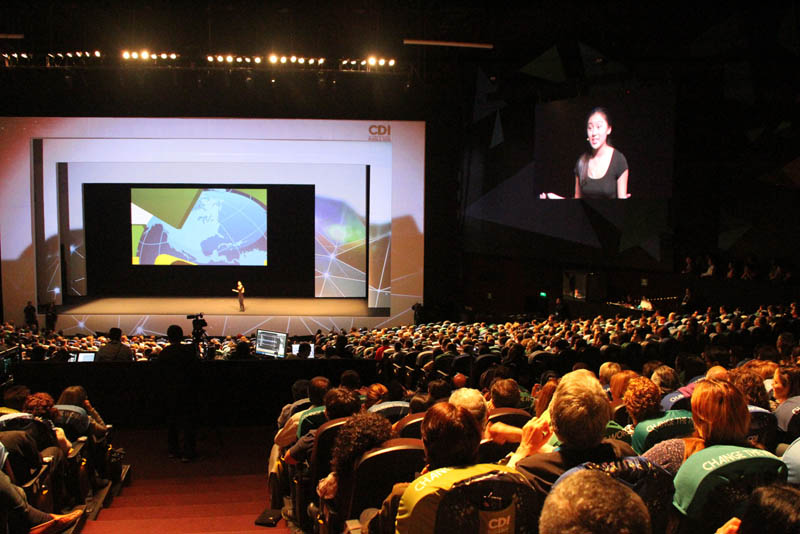
YL: I’m sure a creative powerhouse as you is not tied in by such a project? There’s more happening in your life?
Cassandra: Definitely! I am interested in so many things. I run cross-country, play tennis, play piano/guitar/ukelele, and love to hang out with my friends. There’s honestly so many things that I love to do.
YL: Yeah, that’s good to hear, haha! So, running a grease-to-fuel project is feasible for anyone – pretty much like being in a sports club? That’s what kids do anyway, and manage really well. No big deal?
Cassandra: My dad always told me that don’t just work hard, work smart! As I said before, you can run things efficiently if you use your resources wisely. For example, a lot of TGIF tasks were run by our business parners and they run it professionally.
YL: Still, what keeps you going, what’s the FUN factor?!
Cassandra: Being with my friends and getting to work with them is really fun. It definitely has a lot more meaning for me because I get to see my friends! Also I like to travel and I have visited many places during my speaking trips. I was inspired by other speakers such as Spencer West and unbelievably happy when I was able to inspire others. These once in a lifetime experiences keep me going!
YL: It’s a pretty awesome experience. You’re meeting adults at eye-level. How’s that?
Cassandra: It’s really cool, because when you talk with adults you can really tell that they respect you and want to hear what you have to say. I think it’s important for all kids to feel like that – like they have an audience that cares and is willing to listen.
YL: Actually, you are coming with higher than eye-level to some people. Is that ever a problem?
Cassandra: No, not really. We try not to get too ahead of ourselves!
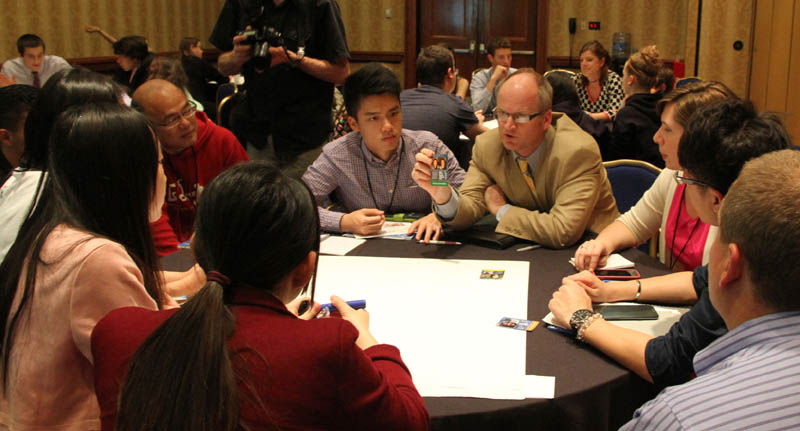
YL: If you imagine a worst case scenario in a conservative place: how be smart and avoid that old school principals feel embarassed by oh-so-clever green-talking kids? I swear this happens. I consider it even the biggest obstacle and driver behind old school dirty energy support. It may be an ego problem. What’s a strategy for … Exxon city schools?
Cassandra: We never ran into this situation before; we always show our respect to the principals and teachers during our presentations.
We also try not to outsmart any adults. My philosophy is that you need to respect them before you can earn their respect.
I think this has worked well so far.
YL: These are very wise words. Very precious. So, if you guys were flown in to kickstart and train the entire City of Glasgow, Scotland, oil-dropping fish’n’chips capital of the world on grease-to-fuel… what would be your team roles? What team size do you suggest for schools to take on their district?
Cassandra: It would be super cool if this becomes a reality. Again, we would do sufficient research before the trip and lay out a list of options which may be accepted by locals. And I wouldn‘t say we came to train them; instead, we came to share our experiences with them. My team’s role is to inspire the young people and let them know they can make a difference no matter how old they are.
If the whole school is going to do a project, I may suggest having a race going among all teams with; friendly competition is always a great motivator!
The students can form their own teams with their friends. We may give away prizes for the top three teams that recycle the most grease.
YL: I almost forgot. When we talk about scaling, this is not only for school students! This actually has real monetary value, considerable value. So, in places where school students cannot do it, for example for legal reasons, and where recycling structures are not established, people could also start it as a green business. Or environmental organisations could start it as a social business. Even those working with homeless people! And the generated funds could flow into their charity projects. Am I thinking in the right direction?
Cassandra: Yes, definitely! That’s where we’re going! This is definitely a social enterprise. Imagine how much that diesel costs per liter at the pump? This can be a big business!
YL: If I imagine someone starting to collect grease, what kind of partner facility does this person need to connect with to turn it into fuels? Some bio-refinery? What exactly do they do to turn it into „real“ fuel? Could someone else set up such a business in places where it doesn’t exist, yet? What does it take?
Cassandra: Here is the breakdown of the process:
The collectors can have a truck with the capability to pump grease into its tank. The tank sizes varies from 1600 liters (small truck) to 24,000 liters (huge trailer).
Then the collector either brings the grease to a facility to remove the food scraps and water through a heating and filtering process.
The next step is called transestification that is usually done by refiners. There are stand-alone biodiesel machines available for making small batches of biodiesel. In the U.S. many people just make their own biodiesel reactors from parts bought at Home Depot. You can be a refiner as long as the final products consistently meet standards to use in a vehicle or heating furnace. Certain licenses may be required in different countries for your location, pollutants control, waste disposal… etc.
YL: I believe these potentials exist throughout North America and Europe, for sure. But it’s also highly interesting on continents with less developed energy infrastructures. For instance, in many places, people use petrol to run … electricity generators. A better option would be solar and gravity lamps, but until they are available, why not use biofuels. Also for transportation. I remember my Berlin neighbour even ran his Range Rover truck on vegetable oils – because it’s cheaper. He said it’s fine, the only difference being the pancake exhaust smell. It’s illegal in Germany, but certainly legal in many places. Would it work for this, also? Do you know?
Cassandra: By talking to people during travel, I have discoverd that several not very developed countries reuse the grease for cooking until it is all used up. So you may not be able to collect the grease as waste in these countries.
Many vehicles with diesel engines can take raw vegetable oil or biodiesel; however, the vegetable oil has gel problems in the winter and may stall the engine. It also violates the vehicles‘ warranty and it’s illegal in many countries. Biodiesel that meets standard specifications can blend with regular diesel with different ratios in order to run the vehicles year long. For example, you can run B100 in the summer and B20 in the winter.
YL: Okay, back to us, right here, right now. What have you learned best from the adventure?
Cassandra: I’ve learned that you can never stop learning (haha). This project has led me to so many amazing places and I’ve learned so much, it’s impossible to narrow it down to just one thing!
YL: Was there something else? Did I hear about some Alex thing?
Cassandra: Yeah, my brother had a project on recycling electronic waste a few years ago. His team took in old computers, refurbished them, and gave them to people without resources for computers.
YL: I think he might soon feel he has to take on some new venture, as his little sister’s tgif starts flowing everywhere.
Cassandra: Maybe so! He’s in college, so that’s a new venture for him.
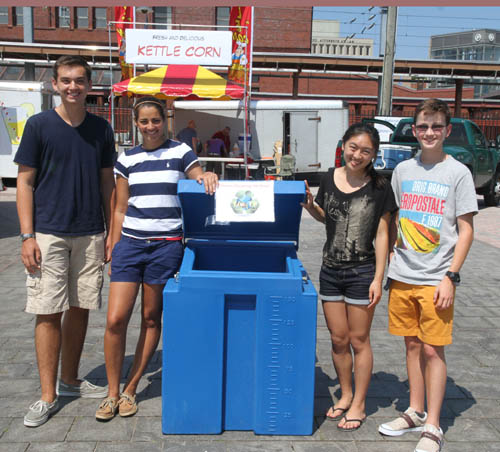
YL: What brought you to Asia? I remember you in Asia for TGIF?
Cassandra: I went to Beijing University in Beijing, China to receive an award at the „You Bring Charm to the World“ awards. I was asked by a reporter during the award ceremony to give suggestions to the Chinese government about managing their cooking grease, which is a huge issue in China.
YL: So, the world is ready?
Cassandra: Some parts of the world are. The world should have good government regulations and a working system. The rest of the world may need to find other innovative way to make this happen!
YL: What’s next for you? What’s next for TGIF?
Cassandra: We plan to expand to all six New England states in the next five years! Hopefully we will be able to pass similar legislation to our Used Cooking Oil Recycling Act in other states as well.
YL: Yaaah, I’m happy to see you’re really someone on a mission, while still having so much ease and fun. Great! Wow, – I think we’re done it. We’ve reached our goal: Anyone, of any age, can launch this in their city, now. If it requires upgrading legislation, it’s part of the adventure. They have the best possible reference package, now.
Cassandra, – what can I say – hank you very much for your time. It’s been huge, but good things need time and depth. It’ been invaluable for this cause and this unique approach for a global solution – and the ones who can drive it are young people – better than anyone else.
Is there anything else that comes to mind for biofuel teams around the globe?
Cassandra: Just go for it! Cliche or not, you can do anything you set your mind to. Once you start, don’t quit!
YL: What can readers do – right now?
Cassandra: Share this message! Get the word out to your friends, families, schools, communities etc. Take advantage of social media and spread the word!
(Note: The YL Story Set and Poster Sets, book and cardgame include her story, with QR links to online profile with videos, interview and action guide; YL Speakers may be available)
YL: Right on – that’s a one minute action with magic potential. Hi5!
A message to the young generation – to conclude?
Cassandra: In almost everything that you do, there are always going to people who want to bring you down. Don’t let them! You can take it as motivation to work even harder. Please never give up!
YL: One for teachers and parents?
Cassandra:
Support your kids! When they’re really passionate about something, the best thing you can do for them is be there and let them know that you believe in them and what they are doing.
Sometimes all kids really need is to hear that and know someone cares, and that they are important and what they’re doing matters.


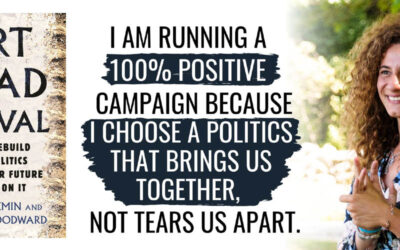
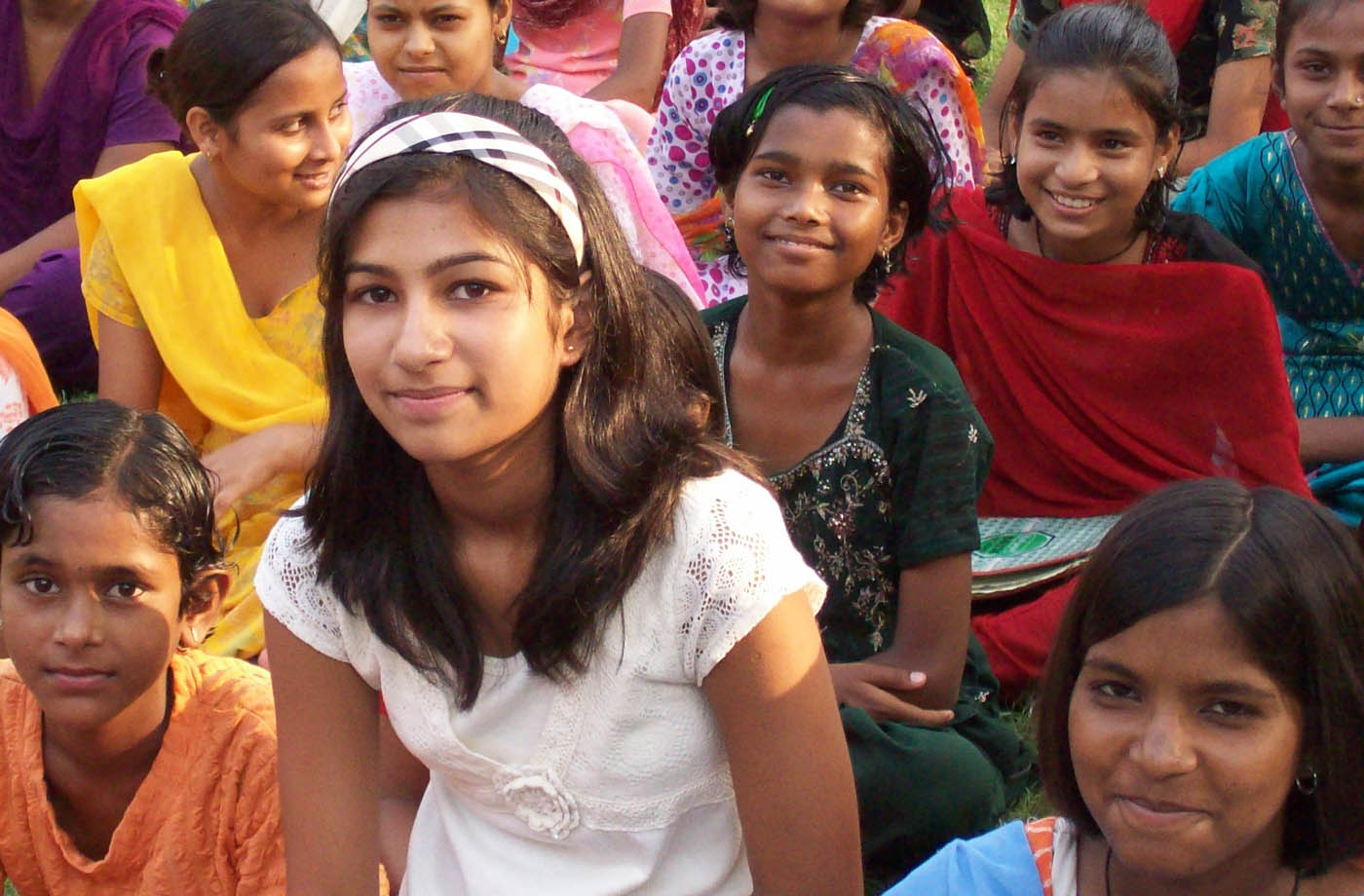
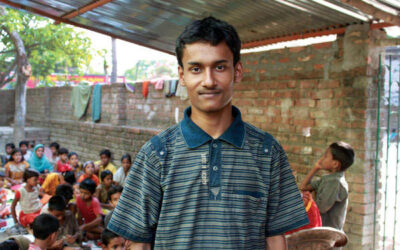

0 Comments